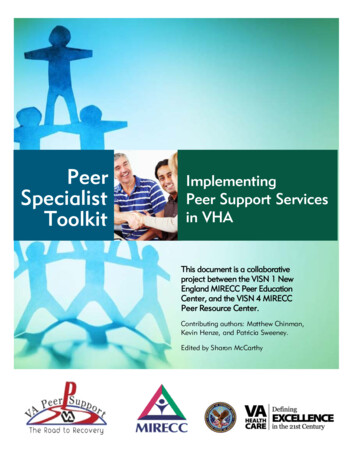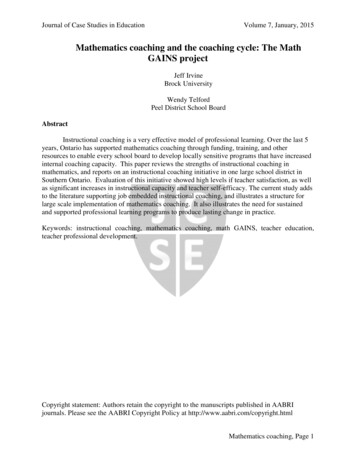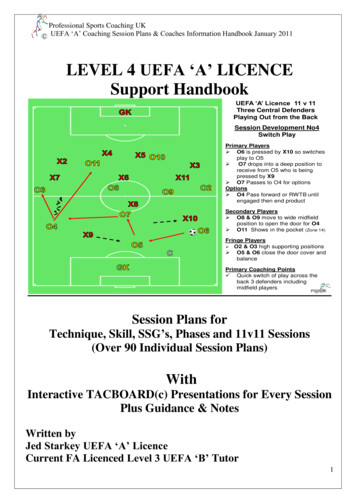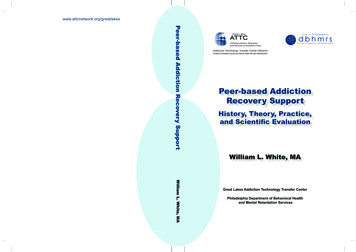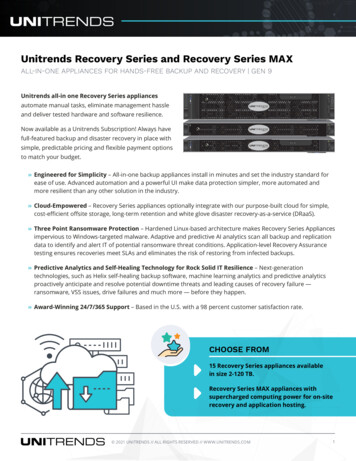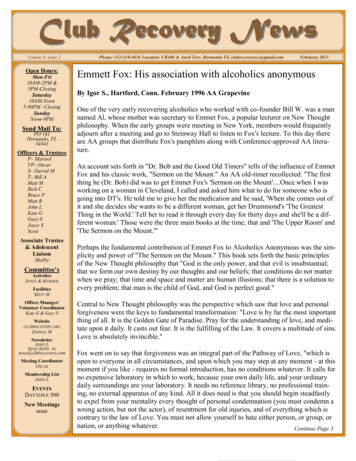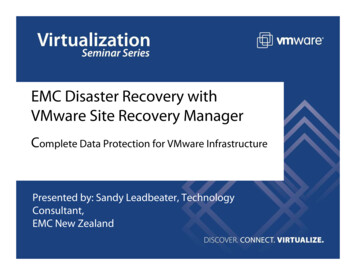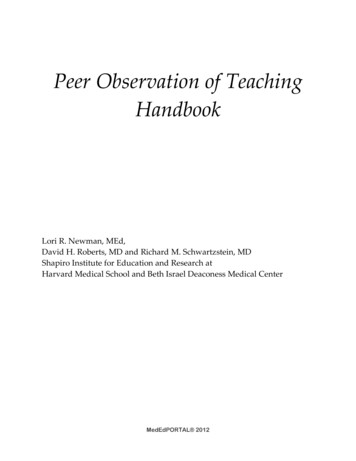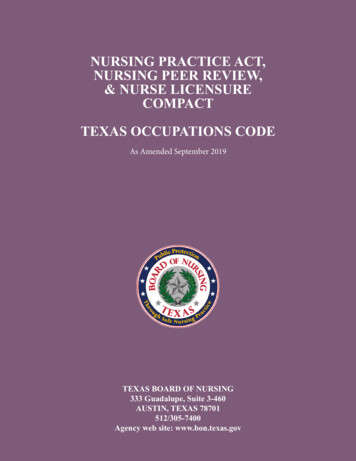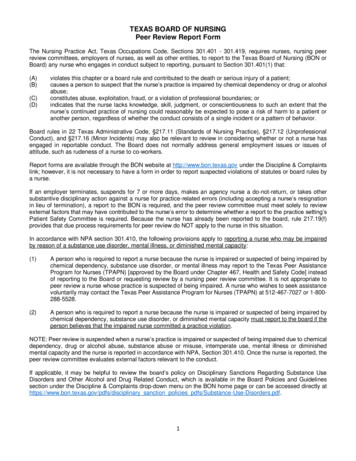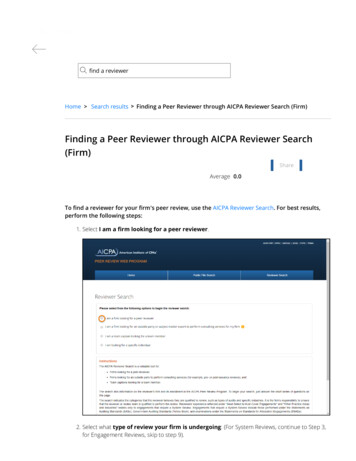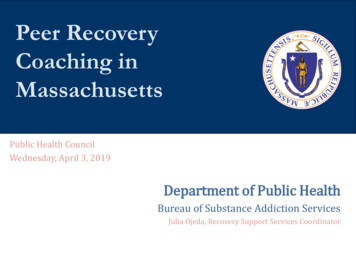
Transcription
Peer RecoveryCoaching inMassachusettsPublic Health CouncilWednesday, April 3, 2019Department of Public HealthBureau of Substance Addiction ServicesJulia Ojeda, Recovery Support Services Coordinator
DPH (BSAS) Peer RecoveryCoaching in Massachusetts Timeline2008 CCAR (CT Community for Addiction Recovery) established Recovery Coach Academy Curriculum2011 BSAS contracted CCAR for two trainings funded by Substance Abuse Mental Health Services Administration’s(SAMHSA) Access to Recovery (ATR) Program2013 Recruited/hired MA trainers & provided RCA trainings statewide (6 regions)2014 Public Health Emergency – Opioid Overdose Crisis2015 Peer Recovery Coaches (PRCs) became a new covered expenditure in Outpatient Procurement ( ATR/STR,Moms Do Care)2016 MBSACC initiated CARC (Certified Addiction Recovery Coach) requirements2016 BSAS, in partnership with MBHP, funded Emergency Department Recovery Coach Pilot Programs (11 hospitals)2016 Created distinct peer Recovery Coaching Supervisor training curriculum statewide2018 MassHealth approved Peer Recovery Coaching as a reimbursable benefit - BSAS collaborated with MassHealthon performance specifications2018 RC Workforce Scan looked at BSAS funded/contracted and non-BSAS funded/contracted programs providingPRC services in the state2
What a Peer Recovery Coachis akerBankPersonalDriverCaseManager3
Peer Recovery CoachAssist toMaintain &SustainRecoveryNavigateSystems &RemovesBarriersSupportsMultiplePathways ofRecoveryEncouragesHope &OptimismLinks toRecoveryCommunityCollaborateson WellnessPlanMentor, Advocateand Change AgentTools Used:Lived Experience, Stages ofChange, and MotivationalInterviewing4
DMA RC Scan Interviewees Reported RC Role: Across All Settings Connect to wrap-around servicesand supports Identify culturally andlinguistically sensitive services Navigate criminal justice system Attend some appointments Prevent relapse Identify goals Build healthyrelationships Encourage hope and motivationFoster life and coping skillsBuild rapportServe as role modelSupport familyShare personal storyWellness PlanningSocial andEmotional SupportService NavigationRecoveryCoachCommunityOutreach andAdvocacyResource Sharingand Linkage Support employment Serve as gateway to largerrecovery community Foster positive social network Facilitate access to educationEngagement inTreatment Engage appropriate level of care Support relationships withproviders Facilitate membership inrecovery centers5 Public face of RC services Increase awareness of RCservices Service team member Multi-agency engagement Fight stigma
Early EngagementPeer Recovery CoachOutreach, Crisis (acute),Intervention, and ReferralProvides briefsupport regardless ofStage of RecoveryPolice & Fire Stations,Emergency Departments,Coalitions, Drug Courts,and some hospitalsSome individuals serve asboth Early EngagementPRCs and long-termPRCs. Reports to a trained PRCSupervisor if billingMassHealth/ BSAS. May require more settingspecific trainings.Limited coachingMay refer to RC forlonger engagement6
DMA RC Scan Interviewees Reported RC Role: Setting-specific SupportOutpatient Providers Wellness planningEmergency Department Crisis management Post-overdose support Naloxone education Post-discharge follow-up Motivation to stay aliveand enter treatmentDrug Courts Court hearingsAccess to Recovery Program Clearing warrantsOpioid Urgent Care Centers Secure detox bed Harm reductioninformationRecoveryCoachCoalitions Crisis management Post-overdose support Food and housing resources Appointment reminders Transportation Harm reduction strategies Treatment programconnection Community engagementtrainings7Moms Do Care Program Pre-natal support Six months postpartumsupport Support groups forbreastfeeding and for trauma Resources for mom and baby Home-based supportPolice Departments Crisis intervention Rapid placement intotreatment Risk-based outreach Naloxone education anddistribution Post-jail planning Overdose follow-up Home visits Family and friends support Recovery trainings for police
Typical Pathway to becoming aPeer Recovery Coach in MassachusettsLived Experience inAddictionStable RecoveryRecovery Coach AcademyOther Trainings(Ethical Considerations, Cultural Competency, Mental Wellness,Addictions 101, Motivational Interviewing )Work/Volunteer as PRC - 500 hoursinitial and ongoing supervision bytrained PRC SupervisorApply for CertificationNot all RC’sfollow thispathway8
CCAR Recovery Coach AcademyThe Recovery Coach Academy (RCA), developed by CT Community for AddictionRecovery (CCAR) in 2008, is a 5-day intensive training delivered in a retreat-likeenvironment, focusing on providing skills needed to guide, mentor and supportanyone who would like to enter into or sustain long-term recovery from anaddiction to alcohol or other drugs. The CCAR model is currently used nationwide for training recovery coaches. CCAR requires that trainers of RCA take the CCAR RCA and a CCAR-approved Training ofTrainers. BSAS provides CCAR RCAs and has permission to conduct Training of Trainers in MA. Other organizations/individuals also provide the CCAR RCA in MA separate from BSAS.The training includes: role and functions of a recovery coach, values/principles, stages of recovery,culture, recovery, stages of change, power and privilege, ethics, boundaries, coaching, motivationalinterviewing and wellness planning.
The BSAS-funded Recovery CoachAcademy (RCA) application requires: 2 years of abstinence from active use of illegal drugs,alcohol and non-prescribed medication Stable pathway of recovery Connected within the recovery/addictions community asa volunteer or employed Access to and/or supervised by a BSAS-trained PRCsupervisor High School Diploma or Equivalency10
Common Expectations to beHIRED as a Recovery Coach*Depends on setting and funding 1-6 yrs. abstinence from illegal drugs, alcohol and non-prescribedmedication and in recovery Completed 5-day RCA & actively working towards a CARC(Certification Addiction Recovery Coach - MBSACC) Supervised by an BSAS-trained Peer Recovery Coach Supervisor High School Diploma or Equivalency11
BSAS Peer Recovery CoachSupervisor Training2WebinarsIndependentWorkTraining3 daysOne-monthOrganizationAssessment &RCObservationsCoachingCollaborativeReview1. Keepingfidelity to themodel2. Advocacy12
BSAS Expanding Peer RecoveryWorkforce FY13-FY18Number of Individuals Trained in MassachusettsRecovery Coach Academy (RCA): 1208RCA Ethical Considerations: 573BSAS RC Supervisors: 331BSAS Deaf Recovery Coaches working: 16BSAS P.T. Recovery Support Trainers: 17CARC MBSACC Certified Recovery Coaches: 85 BSAS Suite of Trainings Offered for Recovery CoachesMotivational Interviewing, Addictions 101, Mental Wellness, CulturalCompetence/Humility, Self-Care, MSR for Recovery Coaches13
Some Current ResearchBSAS FY18 Peer Recovery Coach Scan DMA Health Strategies conducted a scan of 209 RCs working in 33BSAS funded and/or contracted programs in FY18MGH Recovery Coach Efficacy 2018 Report “6 months after engagement with a recovery coach, compared to the6 months prior to the engagement with a recovery coach, patientshave a 44% increase in attendance at outpatient primary care andbehavioral health visits, a 25% decrease in inpatient admissions, anda 13% decrease in Emergency Department visits.”(MGH provided BSAS this paragraph with permission)14
Careers of Substance Website Recovery Coach/ Peer Worker Main Page Recovery Coach and Recovery Coach SupervisorTraining Calendar (with dates and locations) Full Statewide Substance Use Training Calendar Job Postings – post and search positions and resumes15
Department of Public HealthBureau of Substance Addiction ServicesThank YouGraciasAny Questions?16
Apr 03, 2019 · Recovery (CCAR) in 2008, is a 5-day intensive training delivered in a retreat-like environment, focusing on providing skills needed to guide, mentor and support anyone who would like to enter into or sustain long-term recovery from an addiction to alcohol or other drugs. The CCAR model is currently used nationwide for training recovery coaches.File Size: 1MB
